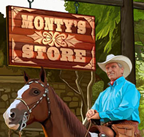Bjorn came in the our family 2 weeks ago. We are dog trainers and future veterinarians, but with horses we have 0 knowledge. It is our first horse, he is a 9 months old and was kept tied all his life until now. He was for the first time outside the barn without his mother and without beating (I think). He is very head shy. The first days were pretty ok, I kept him tied for another 3 days and I was walking him twice per day. He had and still has some moments of panic, especially that there are a few dogs that bark at him, but... After these 3 days I let him loose in his paddock and the real problems began. He is more and more protective in his paddock, he tried to kick me twice since yesterday just for being there to feed him - I didn't had these problems until now - and also his biting issue is escalating. When he arrived he was biting very rarely and very soft, now he bites often and more powerful. Also when I walk him outside (leading) he is biting me more and more.
He also came with a young calf form that farm. The calf is around 10 months old and they are inseparable, like if I go outside with one of them, the other breaks the door of his barn to go outside as well and they try to mate with each other (I know that this is impossible, but still the drive to do it exist). I think that this can be one of the horses behavior problems? - regarding the young cow in heat?
Outside the horse is free to run, I don't lead him for one week, I just let him loose.
What can I do with him at this age to temper him?




I'm patience person when it comes to animals, dogs learned me this. I have a lot of experiences in dog training, but as Monty said also, the horses are prey and have a different behavior that I still try to understand.
I am not into using pain into animals. I have done some rehabilitation with some very aggressive dogs and still didn't use painful methods. I like to think that I am using positive reinforcement, like I am rewarding positive behavior and ignore the negative one.
I also want a horse trainer to come and guide me, but here in Romania until know I found trainers that told me that horses that bite and kick must be beaten hard 'just to know who is the boss'. - I didn't do it with the dogs and certainly I won't do it with Bjorn.
So, the cow is not a problem, the kicking is not a real problem is he only tried, but very 'gently', I can give it time just for neck rubbing, but what do I do with biting as this behavior is escalating because I just ignored him?
Welcome to the forum! From what I read above, you seem to have the right mentality to become a great veterinarian and horsetrainer! I think Jo gave you some very good advice, have a lot of patience and be very aware of your own inner tension. Deep breathing will help you and your youngster! Give a nice sigh before you step into his paddock...
Now the biting: I guess in Romania you'll have some kind of cold winter like all of us, so this could be the season that will help you. Put on thick clothes, many thick sleeves will protect your arms, a double coat will help you not to worry about a bite or two. Not that you want him to bite, you might even let him find your covered elbow, when he tries to bite you, but with thick covering you'll not have to worry about being hurt. This way he'll find out that he's not impressive to you. So let him bump into your elbow and continue doing what you did.
Young male horses seem to have the tendency to show their teeth, just make it uninteresting for him with you.This is their way to show their dominance. We don't want to enter that discussion with them, you were looking for his trust! Work on that and a lot of issues will take care of themselves!
Please consider this forum as a deep well of knowledge and advice, come to it whenever you feel like it, we're here to help and learn from eachother!
Keep the good work going, and keep us posted!
Miriam
Another thing that I observed since last night: when I am down, picking something (water bucket, a hand of hay, tie my shoes, etc) he is coming fast to me biting and trying to come over me. Is this the same behavior that he has with Aida or is it something else? Why is doing this only when down?
http://www.dailymotion.com/video/x594c6q_bjorn-biting-aida_animals
And Miriam, thank you for suggestions, it is very true that they sense your tension, exactly like dogs. I am working at it. If you can see the video from my first day, when a was pretty lefty with leading Bjorn (I know now, it was too soon), exactly at the end I stopped with my shoulders square and he then tried to flee. I was too confident, after that I became to soft. I try to find a middle pathway. :)
Thank you guys.
http://www.dailymotion.com/video/x594co8_first-day-with-bjorn-first-time-for-me-handling-a-horse_animals
I'm not sure I can be of much help, but I will offer a few observations and thoughts.
First off, Bjorn is a pretty little colt! But he looks small for a 9 month old - unless of course he's a pony. Do you know what kind of breed he is?
Secondly, I reacted quite a bit to him being tied up all his life. That is no way to raise a foal so I am glad you got him away from there. I wouldn't be surprised if a lot of his issues are a result of that.
Cows and horses are both herd animals so I'm not surprised they seek each others' company when they have lost everything else they know.
It's good he isn't alone, but cows and horses, however similar at some points, do have differences in their language and behaviour. I can't help but think - although I realize this is probably not something you can do - that both of them need a companion of their own species. Preferably slightly older to teach them manners and correct body language. Or else, this will be up to you.
Watching him with Aida, it feels more like he chasing her in a stressed out manner, rather than being playful. He is definitely trying to dominate her with the bites across the withers and to the leg (to get her to buckle down) I'm not too sure Aida appreciates this. Cows don't do that to each other, but I'm thinking she doesn't know much else, and is desperate to have a herd, so she will put up with it.
Be careful, though! One day, she might get back and horns can cause ugly damages. You could also end up with an aggressive cow if she feels harried and nervous.
If he is doing the same to you, it is most likely for the same reasons: playful or seeking dominance. Some colts just love to "pick a fight" - it's in their DNA! Maybe you should consider gelding him as soon as possible? That will take some "oompf" out of him.
When my colt was at his worst with biting, I had to resort to put drops of Tabasco on the arms of my jacket and the lead rope. Not really something I recommend but the very smell of it stopped him from trying so we could move on and past that.
Kicki I don't think he has any breed in him or if he has maybe you guys can help me discover. :) Anyway this doesn't matter for me. He is now around 160 cm. He is just a horse, like the people around here say and of course I will neuter him.
The biting is now his main activity with us, he is nibbling a lot also. Overall our relationship improved a lot, but we are far from being there were I want. I know it sounds funny this paragraph, but the biting is the only real issue, everything else I think I can manage with him. :)
Today I uploaded another video for you to watch and say your opinion about us.
Tell me what you think.
Bjorn desensitivation
Please look at 5:20 to see his biting habit.
I will do exactly what you told me tomorrow and I will try to film it from the beginning.
What about the biting when he follows? Why are you so sure he wants to please me? What are the signs?
Hope that helps you
Bud
We can be so grateful for the new tool on this Uni, being able to give links to video's!
This way it was possible to see you work with Bjorn and give even more specific advice, as Kicki, Jo and Bud did above.
Overall I think you should bring in far more quiet into your training, it's never a match or a fight... even if Bjorn is still growing, we could never want to enter a discussion of 'who wins' into our horsework. What you're looking for is his trust in you!
Trust must be earned by setting up clear rules and clear rewards for good behavior.
Tools are as good as the hands that hold them, this goes for horsetraining too.
Your hands are going to show the horse when he did something 'right', by releasing the pressure on the leadline. When he is reacting to your stimulus, keep the pressure up.
But as soon as he stands still, release the pressure. You'll have 0,3-3 seconds for your release, which means 'immediately', otherwise your horse might associate it with the wrong behavior. But to set him up for succes, you should start with a very small stimulus and then increase it.
Give him the chance to do it right...Trust your horse to behave like you want him to, trust is a two-way-street!
Did you watch Monty's lessons with "Lauki, on tour", here on this Uni?
These lessons might give you a lot of information about 'pressure and release', watch them over and over, evertime you'll see something you didn't notice before.
Please keep us posted!
Miriam